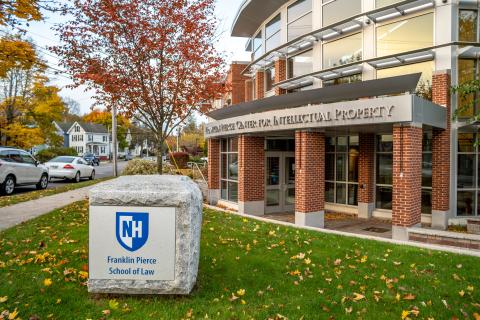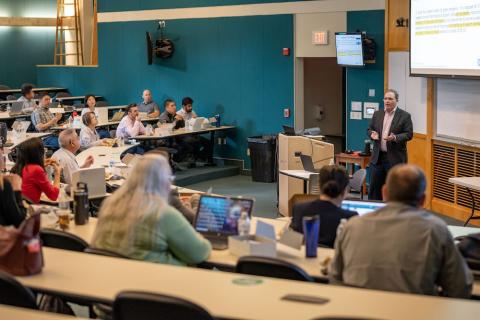COVID, Hybrid, and the Future of Legal Education

Dean Megan Carpenter shares her thoughts on The Legal Impact
If there’s a silver lining to the ongoing COVID-19 pandemic it’s that the necessity of working and learning from home has opened up avenues to business and education that had not previously been considered viable.
UNH Franklin Pierce School of Law was ahead of the trend, launching its Hybrid — “Stay in your home. Stay in your job.” — JD in Intellectual Property, Technology, and Information Law in August of 2019, months before the pandemic took hold. In a conversation with A. J. Kierstead on The Legal Impact podcast, Dean Megan Carpenter discussed the ways in which the field of legal education is pushing forward with the help of technology, resulting in increased applications and reaffirming the value of a law degree. Carpenter appeared at the end of December on the podcast’s milestone 200th episode.
“Here at UNH Franklin Pierce, we’ve far outpaced the nation and the region in our applications and our increases in enrollment,” said Carpenter. “There are a few things that are responsible for that. One is that, during COVID, there have been a lot of people who are reevaluating what they want to do with their lives and how they want to use their time in ways that they can make a difference in the world.”
Carpenter also told Kierstead that the cultural revolution that is putting more emphasis on social justice and equity has motivated people to pursue academic credentials that might help them make a difference in their communities and the world. The dean added that, regardless of whether someone wants to pursue a formal legal education, exposure to the law and how it works should be a requirement in schools of higher learning — perhaps through compulsory college general education offerings.
The sports law certificate program, Carpenter added, is a prime example of an interdisciplinary approach to legal studies. Students in the UNH Franklin Pierce Hybrid JD program are working professionals who bring perspectives from their disparate careers to the classroom setting, where all benefit from their different experiences.
“One of the most amazing things to me,” Carpenter said, “is to see the kinds of classroom discussions that are had when different people bring unique perspectives to the classroom. That enhances the actual learning experience, not just from a textbook perspective, but really for the students themselves.”
Providing opportunities to bring students together is a continuing goal not only for UNH Franklin Pierce, Carpenter added, but for the legal profession in general. If the pandemic has taught us anything, it’s that learning can be done from anywhere, as long as the tools are in place. That realization has only enhanced the profile of the Hybrid JD program at UNH. By not requiring residency to attend law school, the program has opened up doors to more professionals who may not otherwise have pursued a JD.

“To tell people that, not only do you have to invest this huge sum in your education,” Carpenter said, “but also if you're working, you have to quit your job in order to do that and maybe move your family to New Hampshire to get a top legal education in IP and tech, is a huge barrier. We wanted to design a program that would break down some of those barriers and bring our learning experience to working professionals wherever they are. Through that program, we have seen so many people who’ve come to the law in interesting ways.”
Because of the Hybrid JD in IP, UNH Franklin Pierce has enrolled doctors and entrepreneurs, patent specialists, marketing professionals, and educational technologists — folks who find technology and the accompanying legal framework impacting their jobs every day. Colleges and universities, Carpenter told Kierstead, have long been designed as places to sequester those pursuing higher education. That model, Carpenter asserted, no longer fits the experience many are living.
“I advocate for a complete re-conceptualization of what professional graduate education is,” she said. “I think we benefit as we seek to launch the careers of lawyers, not by separating them from the world, but really embracing it. I think COVID has accelerated our country’s willingness to embrace some new ways of learning and technology. But I think that being able to break through that brick and mortar and bring learning to people wherever they’re located should be a hallmark of the future of professional graduate education.”
Listen to the episode here: